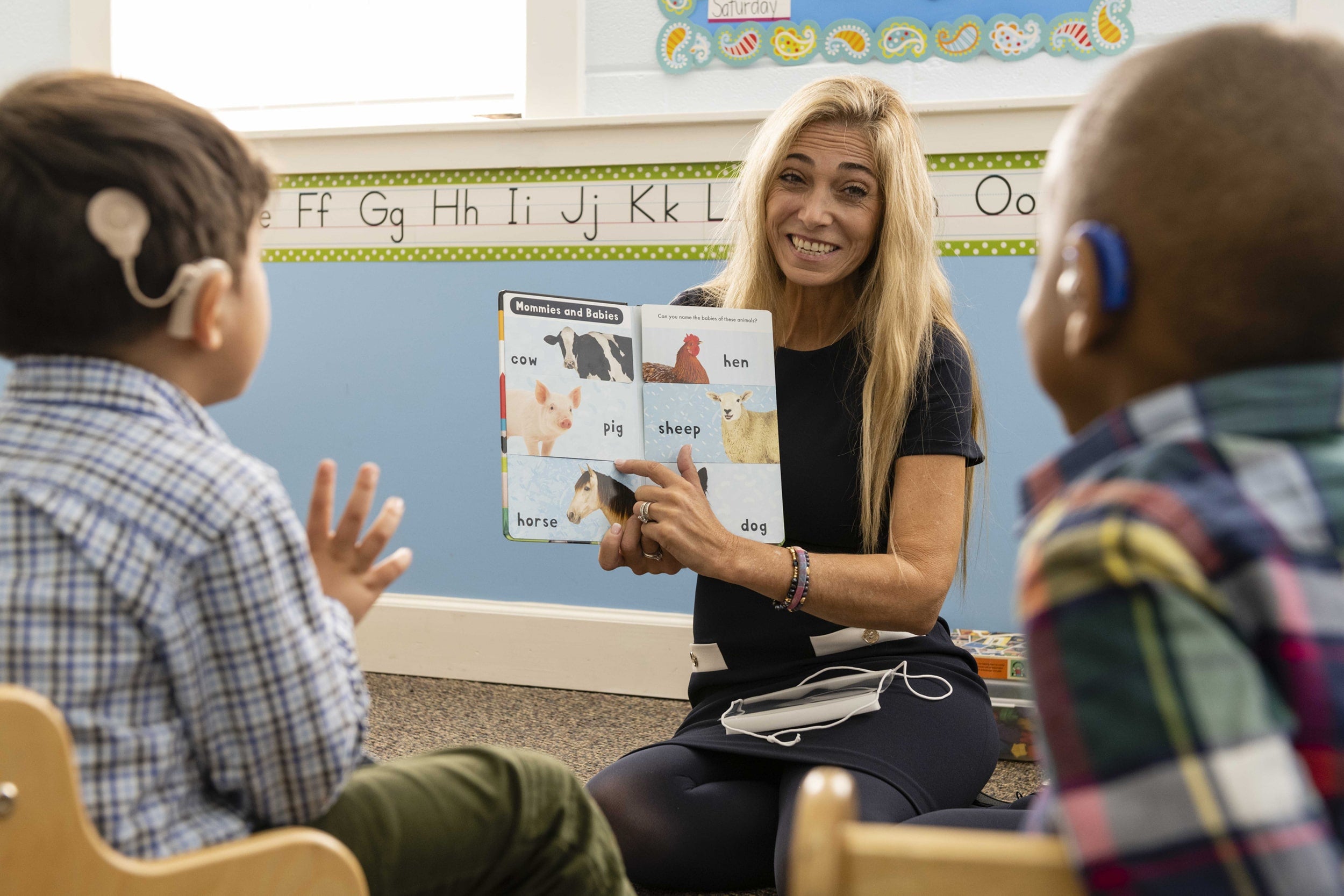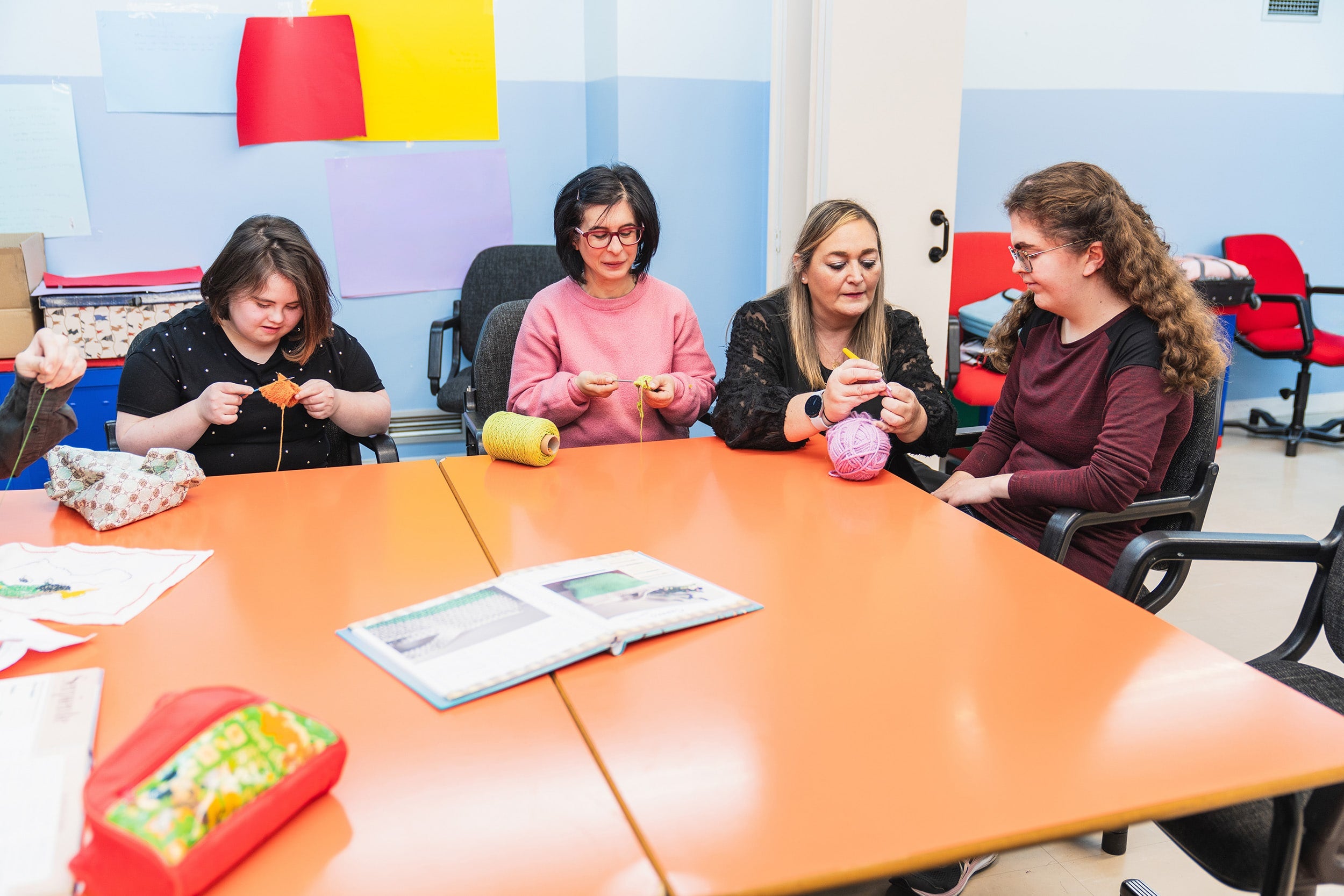Make a tangible impact, helping unlock and restore clients’ ability to communicate as a licensed speech-language pathologist.
Locations
- Armstrong Campus (In Person)
Why Earn a Master’s Degree in Communication Sciences and Disorders?
- Launch a rewarding career with expanding job opportunities.
- 100% employment rate for program graduates.
- Clinical experience right on campus in the RiteCare Center.
- Graduates are eligible to apply for K-12 certification as a service provider in Georgia.
- 56 credit hours to completion.
Get the professional preparation you need to pursue certification as a speech-language pathologist through Georgia Southern University’s Master of Science (MS) in Communication Sciences and Disorders program. You’ll gain a comprehensive understanding of speech, language, social communication, cognitive-communication and swallowing disorders in children and adults, preparing to prevent, assess, diagnose and treat clients in settings ranging from schools to medical clinics.
The program combines in-depth instruction from experienced faculty with abundant clinical experience during all five semesters. You’ll gradually increase your independence as you grow in your skills and confidence, finishing with at least 400 hours of direct work with clients and making a meaningful impact long before graduation.
Ready to Apply?
What Can You Do With a Master’s in Communication Sciences and Disorders?
Your degree marks a key step toward becoming a speech-language pathologist, qualifying you to pursue the ASHA Certificate of Clinical Competence (CCC). In that role, you’ll help kids, adults, or seniors overcome speech- and swallowing-related problems, finding opportunities in settings ranging from hospitals and clinics to schools and public health departments. You can also build on your master’s with a doctoral degree in preparation for a career in research or academia.
Where our graduates work:
- Chatham County Public Schools
- Encompass Health
- HealthPRO Management Services
- Memorial Health
- Savannah Speech and Hearing Center
- St. Joseph’s/Candler
- United States Department of Veteran Affairs
What our graduates do:
- College professor
- Speech-language consultant
- Speech-language pathologist
What You’ll Learn
You’ll build foundational knowledge of how humans acquire language and an in-depth understanding of neuroanatomy, cognitive science and physiology related to speech and swallowing.
Then, a series of courses focuses on distinct types of disorders, including those common to school-age children, and examines evidence-based methods for intervention and rehabilitation.
Starting the first semester and continuing throughout the program, you’ll apply your knowledge and develop your skills in diverse clinical settings, gradually increasing your independence as your competence improves. You’ll complete the program fully equipped to continue in a clinical fellowship and with the supervised hours necessary for certification.
See the CurriculumBuild Your Experience
In this hands-on program, enjoy a rich variety of clinical experiences that cultivate your skills and confidence.
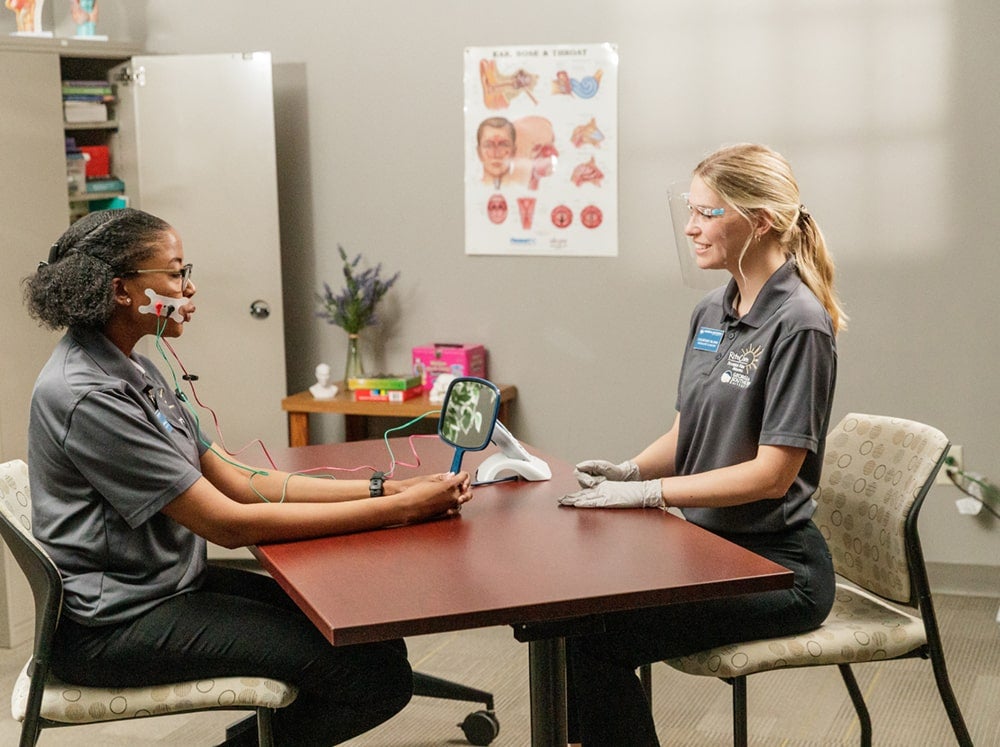
RiteCare Center for Communication Disorders
Gain clinical experience right on the Armstrong campus, working alongside other graduate students and Department of Clinical Sciences faculty to provide extensive services to members of the surrounding community.
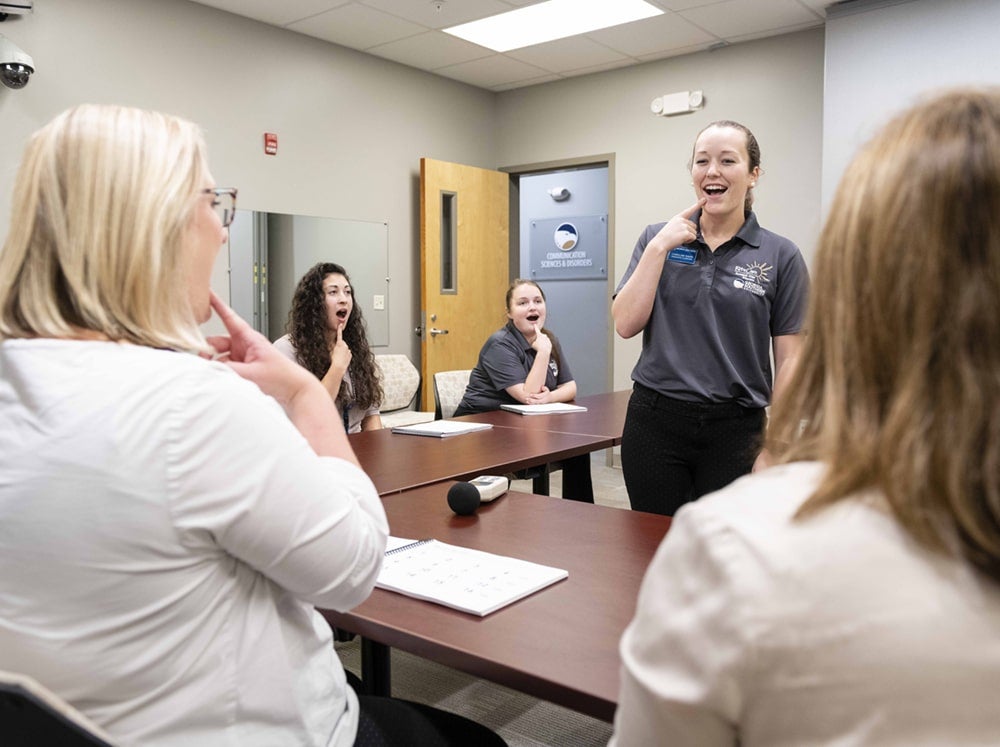
Practicums
Supervised by ASHA-certified speech-language pathologists and audiologists, you’ll accumulate 400 client contact hours, honing your skills with individuals across a range of ages and cultural backgrounds. Settings include schools, health care facilities, nursing homes and more.
Want to Learn More?
Explore essential information about our MS in Communication Sciences and Disorders program, including application details, accreditation status, and licensing disclosures. Gain insight into the program’s credibility and requirements to help you start your journey toward success with the knowledge you need.
The MS in Communication Sciences and Disorders program is open to those with a bachelor’s degree in speech-language pathology from a regionally accredited institution or those with a bachelor’s degree in a field other than communication sciences and disorders who have completed appropriate prerequisite coursework in the field of speech-language pathology/communication sciences and disorders.
Prerequisite courses required include:
- Biological science (the science of living things, including biology, human anatomy, etc.)
- Physics or chemistry
- Social science (psychology, sociology, anthropology, etc.)
- Statistics
Applicants must have a cumulative grade point average of at least 3.0 (on a 4.0 scale) on all college-level coursework.
To apply, please submit:
- An online application through the Communication Sciences and Disorders Centralized Application System (CSDCAS).
- Official transcripts for all previous college- and graduate-level work.
- Official GRE scores. Admission requires a score of no less than 145 on the Verbal Reasoning section (or the equivalent score of 380) and 141 on the Quantitative Reasoning section (or the equivalent score of 430) of the Graduate Record Exam (GRE). Scores must be achieved within five years of the application due date. (The GRE will be waived for Fall 2024 Applicants.)
- Three completed CSDCAS Reference Forms. At least two of the three forms should be completed by professors with knowledge of your academic performance and professionalism. Professors in communication sciences and disorders are preferred. No more than one of the three forms should be completed by a professional reference, such as an employer.
- An essential skills statement. The Essential Skills document includes functions you will be expected to perform during your educational program as a student and professional career. Review this document in its entirety (cover sheet, Appendix A and Appendix B) to understand the cognitive skills, physical abilities and behavioral characteristics necessary to successfully complete the program and work as a speech-language pathologist. A cover sheet with acknowledgment, signature and date MUST be obtained and submitted as part of the admissions packet via CSDCAS.
- A video recording. In place of onsite interviews, the CSDS program requires all applicants to submit a video recording as part of the admissions process. Information regarding requirements for the video can be found in the Questions section of CSDCAS.
All application materials will be submitted through the CSDCAS.
Application Deadlines
All students admitted to the program begin in the fall semester. The application deadline is Jan. 15.
Your application and all required documents must be received by the deadline.
Contact Information
csds@georgiasouthern.edu
912-344-2896
Information sessions are led by CSDS graduate program faculty and include an overview of the program and the admissions process. Information sessions will be held on the following dates and times:
- Fall – Friday, Oct. 18, 2024, 10-11 a.m. (hybrid with tour)
- Winter – Friday, Jan. 24, 2025, 10-11 a.m. (virtual)
- Spring – Friday, April 11, 2025, 10-11 a.m. (hybrid with tour)
If you want to attend one of the above sessions, please register below. All in-person information sessions will be held on the Armstrong campus. Once registered, you will receive a parking pass for in-person sessions or a link for virtual sessions two days prior to the session.
Register for an Information SessionThe communication sciences and disorders program reports data on PRAXIS results, graduation and employment for their accrediting body, the Council of Academic Accreditation (CAA).
Praxis Passing Rate
| Number of students who took the Praxis | Number of students with a passing score | Passing Rate Percentage | |
|---|---|---|---|
| 2024 | 19 | 19 | 100 |
| 2023 | 22 | 21 | 95 |
| 2022 | 17 | 16 | 94 |
| 2021 | 18 | 18 | 100 |
| 2020 | 20 | 20 | 100 |
Program Completion Rate
| Academic Year | # completed program within expected time frame | # completed later than expected time frame | # not completing | % completing within expected time frame |
|---|---|---|---|---|
| 2022-2023 | 22 | 0 | 0 | 100 |
| 2021-2022 | 15 | 1 | 3 | 83 |
| 2020-2021 | 18 | 0 | 2 | 89 |
The Master of Science (MS) in Communication Sciences and Disorders (residential program) at Georgia Southern University is accredited by the Council on Academic Accreditation in Audiology and Speech-Language Pathology of the American Speech-Language-Hearing Association, 2200 Research Boulevard, #310, Rockville, MD 20850, 800-498-2071 or 301- 296-5700.
National accreditation ensures that the program meets specified standards in administrative structure and governance, faculty and instructional staff, curriculum, students, assessment and program resources. Students graduating from an accredited program are eligible for state and national certification. For more information, visit the website at https://caa.asha.org/about/.
Upon graduation, students who complete the communication sciences and disorders (CSDS) graduate program at Georgia Southern University will be eligible to apply for the ASHA Certificate of Clinical Competence (CCC). The CCC is considered the gold standard for employment in speech-language pathology and is required in most employment settings. States may also require a license to practice. The state license is required in addition to the CCC. Some states also require an additional teacher certification to work in the K-12/school setting.
The CSDS graduate program at Georgia Southern University is intended to prepare students to meet the requirements for ASHA certification and Georgia state licensure. Admission into the program or completion of the program does not guarantee that students will obtain the Certificate of Clinical Competence (CCC) or state licensure. Certification and licensure requirements are set by agencies that are not controlled by or affiliated with Georgia Southern University. In addition, certification and licensure requirements can change at any time.
State Licensure: Georgia Southern University has not determined whether its CSDS graduate program meets other states’ educational and/or professional requirements for state licensure. Students enrolled in our program who are planning to pursue licensure in other states are responsible for determining whether they will meet their states’ requirements for licensure. Individual state requirements may be viewed at: https://www.asha.org/advocacy/state/info/.
K-12/School Certification: Georgia Southern University has not determined whether its CSD graduate program meets other states’ educational and/or professional requirements for K-12 certification. Students who complete the Master of Science in Communication Sciences and Disorders program are eligible to apply for K-12 certification as a service provider in Georgia. Instructions regarding the certification process are provided to all students in the fall of the second year of graduate study. In addition, you can view the rules as prescribed by the Georgia Professional Standards Commission for Speech-Language Pathology.
Some states require that teacher certification applicants be eligible for certification in the state in which the master’s degree was earned. As a result, completion of the credentialing process for the state of Georgia is optional but highly recommended. Students enrolled in our program planning to pursue certification in other states are responsible for determining whether they will meet their states’ requirements for certification.
Many of the clinical programs offered by the Waters College of Health Professions require a clinical internship or practicum experience to fulfill degree requirements. Pursuant to the University’s legal agreements, participants in clinical experiences are required to abide by the workplace rules of the clinical site. Sometimes these rules include vaccination requirements. As always, WCHP will continue to make every effort to place students at clinical sites. However, please be aware that we may be unable to locate a site to accept unvaccinated students, which may cause a delay or inability to progress and complete the program of study.
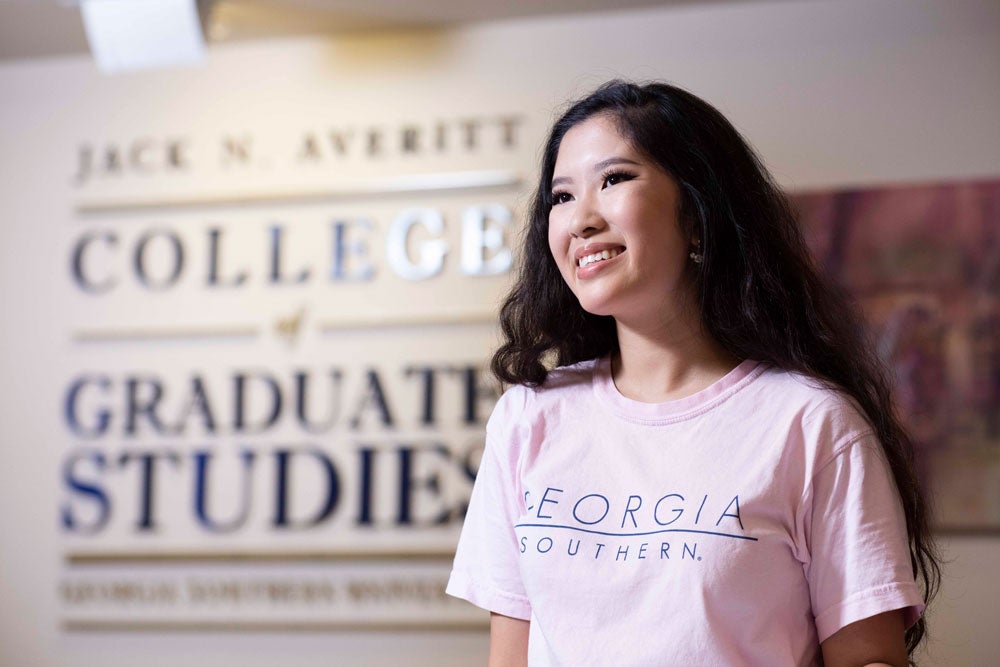
Take the Next Step
Prepare to unlock the power of speech in others through an MS in Communication Sciences and Disorders from Georgia Southern.
Contact Us
Department of Clinical Sciences
Georgia Southern University Armstrong Campus
Department 4902
11935 Abercorn Street
Savannah, GA 31419
Phone: 912-344-2550

